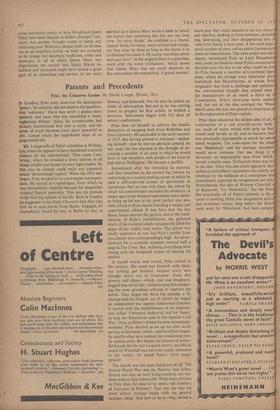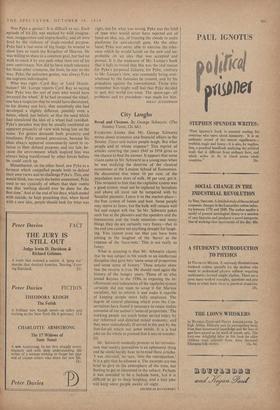Patents and Precedents
Pyke, the Unknown Genius. By David Lampe. (Evans, 18s.)
IF Geoffrey Pyke truly deserved the description 'genius,' he certainly did not deserve the qualifica- tion 'unknown.' There was never a genius more spirited; and none who less resembled a 'mute, inglorious Milton.' Alive, his eccentricities had already transformed him into a myth; and the sense of myth becomes even more powerful as Mr. Lampe traces the improbable steps of an improbable life.
Mr. Lampe tells of Pyke's schooling at Welling- ton, where he appears to have sharpened a natural distaste for the conventional. Then came Cam- bridge, where he revealed a lively interest in all things intellectual except his own legal studies. By this time he already could make any argument sound 'devastatingly logical.' When the 1914 war began, Pyke decided to be a newspaper correspon- dent. He started in Copenhagen, from which he was immediately expelled because his despatches violated Danish neutrality. This was the prelude to the first big episode of his life. Back in London he suggested to the Daily Chronicle that they take him on to send stories from Berlin. Engaged, he immediately found his way to Berlin by way of
Norway and Denmark. For six days he picked up titbits of information. But just as he was settling down to prepare his first article, in walked a detective. Internment began with 112 days of solitary confinement.
Pyke then set himself to achieve the double distinction of escaping both from Ruhleben and from Germany. He succeeded in the early summer of 1915. But having proved to everyone—includ- ing himself—that he was no physical coward, he was none the less alarmed at the thought of be- coming a member of an army in which he would have to rub shoulders with people of the kind he had met at Wellington ! He became a pacifist.
Immediately after the Armistice he married, and then launched on his second big venture by embarking on a money-making career in which he used a self-contrived system of speculation so mysterious that no one ever knew the extent by which his commitments exceeded his resources. A major spur to his financial operations was a desire to bring up his son in the most perfect way pos- sible, which to Pyke meant founding a unique and experimental school. It was here that the late Susan Isaacs entered the picture, and as the head- mistress of Pyke's establishment she gathered much of the material which subsequently filled the pages of her widely read books. The school was madly expensive to run, but Pyke's profits from speculation were correspondingly high. An adver- tisement for a scientific assistant covered half a page in The Times. But, suddenly, everything went wrong with the foolproof system of playing the market.
A mental wreck, and ruined, Pyke retired to the country. His mind was feverish with ideas, but nothing got finished, because every new thought drove out its forerunner. Even dire poverty and illness—which, real and imaginary, dogged him all his life—failed to stop him project- ing the most grandiose schemes to improve the world. Then began the third big episode, a St. George-and-the-Dragon act in which he waged an independent war against continental Fascism. It started with the establishment of an organisa- tion called 'Voluntary Industrial Aid for Spain,' to help the Republican side in the Spanish Civil War. Then, as Hitler's threats became increasingly ominous, Pyke decided to set up his own secret service in Germany, which, until hostilities began, he used to effect as a medium for conducting pub- lic opinion polls. But despite the interest of power- ful friends like the late Leopold Amery, the official world of Whitehall was not even mildly interested in the results. So ended Pyke's third major episode.
The fourth was the most luxuriant of all. The Second World War was on. Norway had fallen; France was lost; we were being bombed; our for- tunes were at their lowest ebb. What more obvious to Pyke than the need to tie down vast numbers of Germans in Norway? That was the way his mind always worked—begin with the general strategic 'need.' And how to do it—why, invent a
snow-jeep that could mano:uvre on any slopes it any weather, dashing in from nowhere, demolisl. ing, destroying, and then disappearing into the void from which it had come. A few such jeeps, $ small number of men, and an entire German arni could be immobilised. This time notice was takers Amery introduced Pyke to Lord Mountbatte$
who, under no illusions about Pyke's eccentricities decided none the less to see what could be dons
So Pyke became a member of Combined °per; tions, where his strange ways infuriated alrno$ everybody but Mountbatten, to whom Pyke originality was both a challenge and antidote the conventional thought that existed even I the headquarters of so novel a force as t Commandos. Pyke's snow-jeep never material' ised, but out of the idea emerged the 'Weasel which, since the war, has played an important patl in the exploration of Polar regions.
Pyke then conceived the wildest idea of all, the, construction of a vast aircraft-carrier built 01 ice, made of water mixed with pulp so that !I would melt hardly at all, and so massive that d was practically impregnable to attack by convell" tional weapons. The code-name for the sche was 'Habakkuk,' and the strategic purposes would serve immense. For one thing, it vd obviously an impregnable base from which I° invade a hostile coast. Technically there was mite to the idea. There was also much against it. But technical and military opposition was utterly over' whelmed by the boldness of a conception whit! immediately captured the imagination not only Mountbatten, but also of Winston Churchill tio° of Roosevelt. Yet 'Habakkuk,' like the Plod, like practically all of Pyke's schemes, in the d came to nothing. Other less imaginative activit had promised victory long before the develd ment work for 'Habakkuk' had been complet
Was Pyke a genius? It is difficult to say. Each episode of his life was marked by wild imagina- tion, exaggeration and impracticality, and all were fired by the violence of single-minded purpose. Pyke had a real sense of big things; he wanted to show how to reach the Kingdom of Heaven. He was willing to share in a common goal, but had no wish to reach it by any path other than one of his own contrivance. Nor did he have much tolerance for those other creatures, the fools, he met on the way. Pyke, the unknown genius, was always Pyke the supreme individualist.
Who was right—Cyril Ray or Lord Mount- batten? Mr. Lampe reports Cyril Ray as saying that 'Pyke was the sort of man who would have invented the wheel.' If he had invented the wheel, one has a suspicion that he would have discovered, to his dismay and fury, that somebody else had developed a slightly different, possibly even a
, better, wheel, just before; or that the need which had stimulated the idea of a wheel had vanished. Pyke's paradox was that he usually combined an apparent precocity of view with being late on the scene. Yet genius demands both precocity and timeliness. Pyke seemed precocious, because his ideas always appeared unnecessarily novel in re- lation to their defined purpose; and too late, be- cause the environment which, inspired him was always being transformed by other forces before he could catch up.
Mountbatten, on the other hand, saw Pyke as a ferment which compelled people both to defend their own views and to challenge Pyke's. This, one would think, was much the better assessment. Pyke used to say cynically of others that their motto was that 'nothing should ever be done for the first time.' And at the end of his days, which ended with suicide, he kept preaching that, when faced with a new idea, people should look for what was
right, not for what was wrong. Pyke was the kind of man who would never have rejected out of hand an idea, say, of freezing the clouds to make platforms for anti-aircraft guns. On the other hand, Pyke was never able to exercise the toler- ance which he would lavish on the new and im- probable on an idea that was accepted and proven. It is the weakness of Mr. Lampe's book that it fails to reveal that this was the real reason for Pyke's perpetual failures; for Pyke, contrary to Mr. Lampe's view, was constantly being over- whelmed by the fantasies he created, and by his prejudices against the conventional. Those who remember him might well feel that Pyke decided to quit this world too soon. The space-age—all problems and no precedent—was made for him.
SOLLY ZUCKERMAN











































 Previous page
Previous page